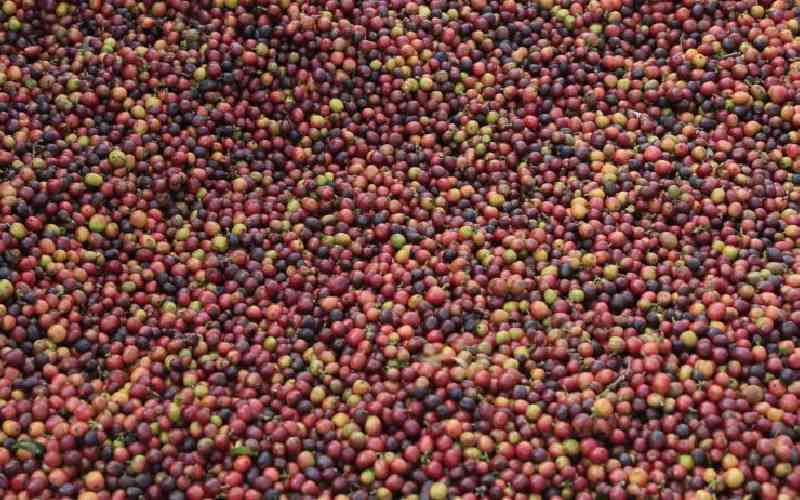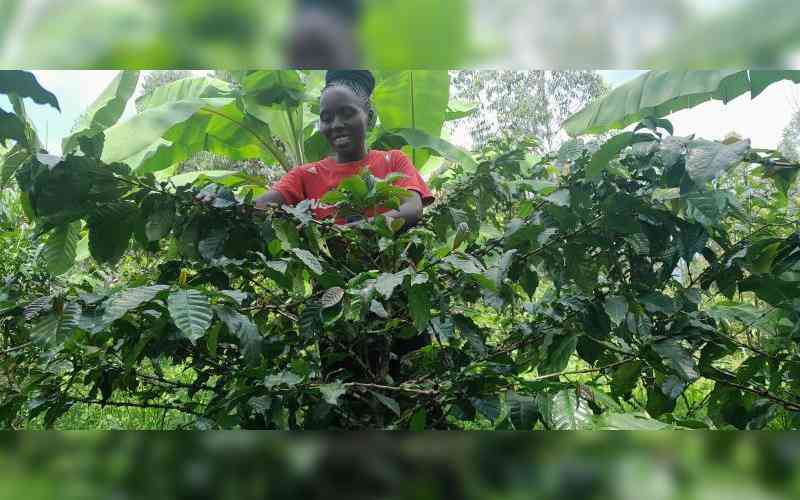If you love a product so much, what do you do to ensure you constantly have it when you need it? Simple. You start growing it. That is Simon Ndung’u’s policy.
Ndung’u, who hails from Kamiruri, Bahati sub-county, ventured into coffee production in 1995 due to his love for the black berries.
“I love my coffee so much. It relaxes my nerves and calms my mind. I cannot do without it. That is why I started growing it,” he says.
Ndung’u, 64, once a bank employee, says the opportunity enabled him interact with coffee farmers from Kiambu, Murang'a and Gatanga which are leading coffee growing areas.
“Managing coffee leased farms as a manager provided me with knowledge and skills on its production,” he says.
The father of seven started in his one acre plot with only 400 seedlings, which he bought at Teremka Coffee Estate Company at Sh10 per seedling. Unlike yester years where he used to purchase seedlings from coffee companies, he now produces certified seedlings from his established nursery.
He has also increased the number of trees to more than 3,000 on his current five-acre farm. Though rewarding, he says the journey has been a learning experience. “To boost my knowledge and produce high grade coffee, I attended trainings and seminars conducted by coffee board officers. I applied for nursery production from Coffee Board of Kenya,” he adds.
It took approximately four years for Ndung’u to reap fruits of his new venture. His first harvest was 500 kilograms of coffee berries, that he sold to Mutungati Cooperative Society located few metres from his farm.
High grade coffee
Farmers used to deliver coffee berries to the society where it was processed and sent to mills in Nairobi. He says the plummeting prices of coffee has seen majority of farmers in the area uproot the crop and venture into other crops.
According to Ndung’u, liberalisation of the sector in 1990s increased number of challenges facing farmers as more brokers came on board at the central auctioning. Farmers were forced to find a miller and a marketer for the produce individually or through societies.
“It was so discouraging. I held my hopes high and anticipated improved prices as the government promised better prices,” he recalls.
In 2000, prices of the commodity increased to Sh80 per kilogram, earning him Sh320,000, which he used to pay school fees for his children. “The best time was when coffee was selling at Sh80 per kilo. I long for such days,” he recalls with nostalgia.
"Since then the journey has been tough," he says.
A kilo of coffee now fetches between Sh15 and Sh40 depending on the market factors. At some point, Ndung’u claims he acquired a loan of Sh200,000 from Coffee Development Fund through the society, only to realise the society had misappropriated the money.
Stay informed. Subscribe to our newsletter
The frustrations forced him to drop from the society in 2013. He bought a coffee pulping machine at Sh70,000 which enables him process his coffee. Once the coffee has been picked, processing must begin as quickly as possible to prevent spoilage.
During processing, the pulp is removed from the coffee cherry after harvesting and the bean is dried with only the parchment skin left on. First, the freshly harvested cherries are passed through a pulping machine where the skin and pulp is separated from the bean.
Quality beans
The beans are later fermented in a fresh water tank for about 48 hours to remove sugar. The beans are separated by weight as they are conveyed through water channels. The lighter beans float on the top, while the heavier and ripe ones sink to the bottom. Later, he does final soaking to remove stains on the bean, then dries them on a drying table. To maintain quality, during drying, he ensures the beans do not crack.
He later selects the dried beans and packs them in clean bags ready for auctioning in Nairobi.
“I purchased my planter to have best graded coffee. I noticed that the society receives cherry from different farmers some of poor quality which in turn affects prices. I also wanted to sell the crop myself,” he says adding “Coffee is all about quality. I realised during auctioning, the society could get lowest prices of the commodity because buyers claimed it was of poor quality,” he explains.
He harvests an average of six kilograms of coffee from each tree. To get a better harvest, he advises farmers on best farm practices including weed control, mulching and weeding.
“Farmers should remove unwanted vegetation after harvesting, remove all broken primary and secondary branches including bearing wound that had cherries,” he says.
Other practices include, fertiliser application, spraying to prevent pests like capside bag, tesis bag and fruit fly among others.
The main challenge, according to the retired banker is fluctuating prices. Taxation in the form of county council cess, road cess also kill morale of coffee farmers. While other farmers continue to uproot, Ndung’u is optimistic that the crop with start to fetch better prices at the auction.
“Coffee is a unique crop. It is Kenya’s leading foreign exchange earner, let’s embrace it. Someday, the rewards will be attractive to farmers,” he says.
 The Standard Group Plc is a
multi-media organization with investments in media platforms spanning newspaper
print operations, television, radio broadcasting, digital and online services. The
Standard Group is recognized as a leading multi-media house in Kenya with a key
influence in matters of national and international interest.
The Standard Group Plc is a
multi-media organization with investments in media platforms spanning newspaper
print operations, television, radio broadcasting, digital and online services. The
Standard Group is recognized as a leading multi-media house in Kenya with a key
influence in matters of national and international interest.
 The Standard Group Plc is a
multi-media organization with investments in media platforms spanning newspaper
print operations, television, radio broadcasting, digital and online services. The
Standard Group is recognized as a leading multi-media house in Kenya with a key
influence in matters of national and international interest.
The Standard Group Plc is a
multi-media organization with investments in media platforms spanning newspaper
print operations, television, radio broadcasting, digital and online services. The
Standard Group is recognized as a leading multi-media house in Kenya with a key
influence in matters of national and international interest.








